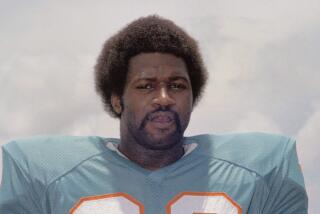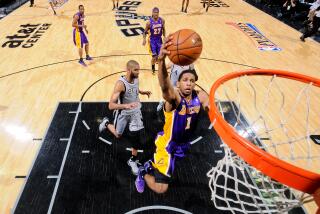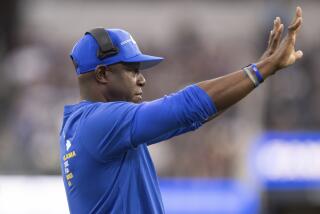Starting Over: Giants’ Joe Morris Has a Lot to Prove
- Share via
EAST RUTHERFORD, N.J. — You might say Joe Morris is a rookie again -- a rookie in spirit and anticipation. He is the possessor of a burning desire to prove to everyone that he still belongs among the National Football League’s elite running backs.
In less than a month, the New York Giants will open training camp at Farleigh Dickinson-Madison, and Morris, who missed all of last season with a broken right foot, faces the unfamiliar task of having to fight for a roster spot.
“There is not a lot I can do about what’s gone on in the past,” Morris said recently. “Right now, I live for each day. When I train I live for that. I look forward to every day of training camp. Every day will be a new challenge. I’m ready for those challenges.”
Just four years since leading the Giants to the Super Bowl XXI championship, Morris’ career is in a precarious state. Here are some reasons why the club’s all-time leading rusher (5,296 career yards) may not be on the Giants’ opening day roster:
--His health. The Giants want to see how soundly the foot has mended, though Morris has been running full speed since November. Experience has made the club cautious. George Adams missed the 1986 season with a chipped pelvis and never was productive again. Karl Nelson missed the 1987 season with Hodgkins disease and was never the right tackle he was in 1986. Morris says he is fine, but the Giants will not be convinced until they see him in full gear.
--The competition. Rodney Hampton, the third-most productive runner ever at Georgia, was the Giants’ first selection in April’s NFL draft. He is one of nine running backs on the roster. Only five or six figure to make the team. Morris will likely have to unseat Ottis Anderson (1,023 yards in 1989), a favorite of Coach Bill Parcells, or versatile Lee Rouson for a spot.
--The Cold War. This may be the biggest obstacle Morris must overcome. During his previous eight seasons with the Giants, Morris has had a love-hate relationship with Parcells and the club’s brass. In 1986, he held out of training camp in a sometimes bitter contract dispute that did not end until he signed the day of the season opener at Dallas. In 1987, he was one of the more vocal supporters of the players’ strike and was angry when the players returned to work without a contract.
Morris and Parcells are hardly speaking after the events of the past year. First, Morris was placed on injured reserve for the season after failing to convince Parcells he would heal from the broken foot in six to eight weeks. In February, Morris was left unprotected during Plan B, an indication the Giants did not have him in their plans for 1990. More recently, Morris grudgingly agreed to a one-year contract for about $500,000, the same salary he made in 1989. There was no raise even though he is the club’s all-time rushing leader and gained at least 1,000 yards in three of the last four years he is played.
There is also the matter of those rumors. Morris was not actively pursued during Plan B in part because most teams thought he wanted $1 million and because, according to Morris, the Giants spread rumors about him being a “psychotic” and “paranoid.” The Giants have denied making such remarks.
Morris, who turns 30 in September, would like to believe his clashes with the Giants will not have any bearing on whether the club decides to release him, trade him or start him this fall. “I’m not a yes man. I have my own opinions and own thoughts,” he said. “But I’ve never been disruptive. I’ve always been supportive. Basically, I’m a good person. But when it affects me from a business standpoint, I’m going to do what’s smart for Joe Morris. And I’ll always say what I believe to be the truth. I think people have to respect you. I respect them (Giants brass) and I think they should respect me for my views and my thoughts.”
Respect and loyalty, according to former Giants linebacker Harry Carson, are two words that have little meaning in the business world of the NFL. In fact, he says Morris’ past run-ins with the club have made a comeback this year improbable.
“I know it did not go over very well with him holding out of camp (in 1986). Then during the players’ strike, Joe Morris was very militant,” Carson said. “If you make the team look bad, and sometimes that’s what contract situations do, the team has a very long memory.”
“Quite frankly, I’m surprised that he is still there. My own personal opinion is that Joe Morris probably will not be a Giant this year. He’ll probably be in some other uniform. I think they (Giants) signed him and I think they’re going to try to get something for him, probably a draft pick or something. I hope I’m wrong. I hope he can finish out his career with the team he started with, but when you look at things that have happened with the veteran ballplayers on that team, you cannot help but think that Joe’s next in line.”
Carson holds some bitterness over the way his stellar career ended with Giants. After announcing earlier in the year that the 1988 season would be his last, Carson was put on injured reserve for four of the final five games, just when the Giants were in the thick of a playoff chase. Carson had undergone arthroscopic knee surgery but vowed he would miss one game at most. Instead, Parcells put him on IR and acquired Robb White from the Washington Redskins.
There is also the case of Jim Burt, the fiery nose tackle who spearheaded the Super Bowl team’s defensive line. The Giants forced Burt to retire in July after he had turned down a Plan B offer from the Green Bay Packers to stay in the Meadowlands. He later hooked up with the San Francisco 49ers and won another Super Bowl ring. Kenny Hill, the strong safety on the Giants’ Super Bowl team, was released early in training camp last year while he was still an unsigned free agent.
Said Carson: “People look at pro football as being glamorous. But pro football is a business. The players know that. That’s why you have very little loyalty. When the oldtimers say, ‘what happened to the loyalty?’ that’s where the loyalty has gone. That’s why players go out and get as much (money) as they can get. When you have injured players who played when they should not have played, but did so for the sake of their team, and then the team turns around and does that to you, there is no loyalty there. Players learn from the experience of other players. Jim Burt once told me, ‘I should have learned from what happened to you.’ I think Joe Morris might feel the same way.”
General Manager George Young understands how some players can get bitter when the end is near.
“I know it is tough to walk away from the money and most of them think they can still play,” Young said. “If they do not want to make a decision, I do not mind making it for them. But they should accept it.”
With training camp approaching, Morris’ spirits are upbeat. He certainly feels better than he did in August when his foot was broken on his second carry in the preseason finale against the Pittsburgh Steelers.
In previous years, Morris would have been placed on injured reserve and been eligible to return in six weeks. But in a rule change passed before the 1989 season, players on IR and not included on the 47-man roster are ineligible for the regular and postseason.
Parcells could have included Morris on the 47-man roster then placed him on injured reserve and activated someone healthy. That way Morris could have been activated in a minimum of six weeks. But the early prognosis from the Giants’ medical staff was that Morris would be out for two to three months and Parcells was reluctant to cut another player in hopes Morris would be ready by November.
The coach broke the news to Morris during a private meeting the day after the game.
“I was not happy about it and let him know that,” Morris said. “I worked too hard during the offseason to let it all go that easily. I wanted to compete.”
Publicly, Morris backed the Giants’ decision. “I feel I could be ready in six to eight weeks. But I support their decision,” he told reporters in September. Privately, the running back felt betrayed.
As the Giants went on to a 12-4 season and a National Football Conference East championship, Morris withdrew from the team. He attended only three team functions during the year, one a union meeting that Morris -- one of the Giants’ co-player representatives -- presided over.
“I just felt out of place there,” he said. “I know how I was about distractions when I was getting ready for a game. I thought I’d be a distraction if I came around. Plus, when I was on my crutches I did not want anybody to see me and feel sorry for me.”
The cast was removed after seven weeks and by late November Morris was playing basketball twice a week. While he contends that proves he could have played the final third of the season, the Giants are not so sure.
“With all the things that a running back has to do, it is hard to say if he could have played,” Giants trainer Ronnie Barnes said. “We’ll never know for sure. But we doubt it. Eric Dorsey broke his foot (in the second game of the regular season) and was still favoring it in the playoffs.”
Said Morris: “I thank the Giants for being concerned about my foot and not wanting to rush me back. But I would have liked for them to have given me a shot last year.”
Whether he earns a shot this year will largely depend on his performance in training camp. One theory is that the Giants will work him hard through the first two preseason games then test his trade value. If he looks too good, the Giants could keep him.
“If I’m going to leave, I’d like to leave under good circumstances where I can say I’ve given it everything I’ve got and things just did not work out,” he said. “I still feel I can play. I can help a team do some things. You’ve got to feel that way about yourself and you cannot let anybody deter you from that.”
More to Read
Go beyond the scoreboard
Get the latest on L.A.'s teams in the daily Sports Report newsletter.
You may occasionally receive promotional content from the Los Angeles Times.










